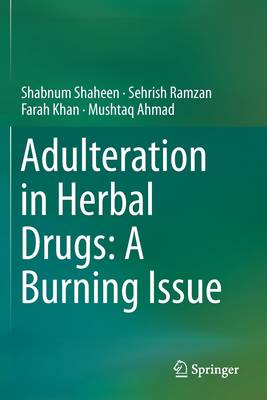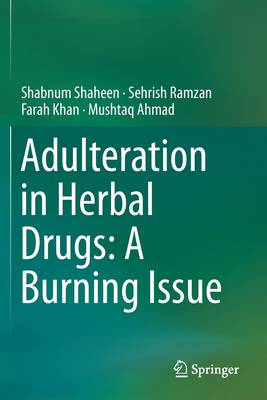
- Retrait gratuit dans votre magasin Club
- 7.000.000 titres dans notre catalogue
- Payer en toute sécurité
- Toujours un magasin près de chez vous
- Retrait gratuit dans votre magasin Club
- 7.000.000 titres dans notre catalogue
- Payer en toute sécurité
- Toujours un magasin près de chez vous
Adulteration in Herbal Drugs: A Burning Issue
Shabnum Shaheen, Sehrish Ramzan, Farah Khan, Mushtaq AhmadDescription
Substitution and adulteration in traded herbal raw material are common practice in the herbal industry due to the extinction of required species, deforestation and incorrect taxonomical identification. Herbalists have adopted methods to create high quality adulteration which cannot be detected without performing microscopic examination or chemical analysis. It is difficult to establish specific quality control standards due to the complex nature and innate unpredictability of the chemical constituents of medicinal herbs.The main parameters for measurement and adulteration prevention in medicinal herbs are morphological and microscopic investigation, chemical profiling and DNA barcoding. The need for highly sensitive and more effective approaches for the authentication of medicinal herbs is necessary in order to promote the acceptance of herbal products.
Adulteration In Traditional Medicinal Herbs is aimed at promoting awareness of adulteration in traditional herbal medicines for the worldwide scientific community. Parameters are established for the prevention of adulteration through classical and modern scientific tools. Valuable case studies are presented based on ethno-medicinal surveys performed in many herbal markets in Pakistan. Collections of various samples were obtained from these shops then compared with the original plants collected from field. Various phytochemical, organoleptic and DNA barcoding techniques were used in order to detect adulteration in the marketed herbal samples. This book is the first of its kind and is aimed at helping the scientific community to identify particular medicinal plants which are facing adulteration problems in herbal markets and to estimate the extent of adulteration and substitution in commonly used medicinal herbs.
Spécifications
Parties prenantes
- Auteur(s) :
- Editeur:
Contenu
- Nombre de pages :
- 179
- Langue:
- Anglais
Caractéristiques
- EAN:
- 9783030280369
- Date de parution :
- 24-10-20
- Format:
- Livre broché
- Format numérique:
- Trade paperback (VS)
- Dimensions :
- 156 mm x 234 mm
- Poids :
- 303 g







